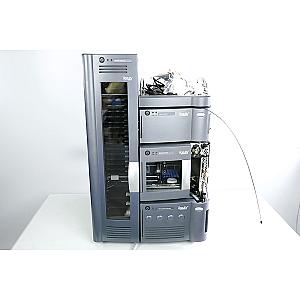The Waters ACQUITY UPLC System is a high-performance liquid chromatography solution designed to improve the productivity and accuracy of laboratory analyses. With a maximum pressure of 15,000 psi and a pH range of 1 to 12.5, this system offers exceptional resolution and sensitivity for complex samples. It helps reduce analysis time and optimize method development, while ensuring increased reliability.
Chromatography system ACQUITY UPLC - Good Condition





Offer Details
Accessories :
Waters Acquity UPLC HPLC System SM BSM CM SO Sample Organizer
Options :
7159
Description
Discover Ultimate Performance with the ACQUITY UPLC System
The Waters ACQUITY UPLC System is a major advancement in high-performance liquid chromatography. Designed to meet the demands of modern laboratories, this system offers a unique combination of resolution, sensitivity, and speed, enabling the analysis of complex samples with unparalleled accuracy.
With its ability to operate at up to 15,000 psi and support a pH range of 1 to 12, the ACQUITY UPLC is ideal for a wide range of analytical applications. The system is equipped with various pump options, including binary and quaternary configurations, allowing precise mixing of solvents for optimal results.
One of the most notable features of this system is its ability to easily transfer existing methods to UPLC technology. This not only improves analytical resolution and sensitivity, but also significantly reduces runtime and solvent consumption. For example, a USP analysis of diclazuril and organic impurities showed a 4-fold reduction in runtime and a 10-fold reduction in solvent consumption when switching from HPLC to UPLC.
The system also features Auto•Blend Plus technology, which automatically formulates mobile phases, reducing preparation time. Additionally, Gradient SmartStart technology facilitates method transfer from an alternative LC system without modifying the gradient table.
In terms of technical specifications, the ACQUITY UPLC is designed for maximum flexibility. It can accommodate up to six columns of 150 mm length and up to 4.6 mm inner diameter. The sample compartment can maintain temperatures ranging from 4 to 40°C, ensuring optimal sample management. The system is also compatible with a variety of detectors, including PDA, TUV, FLR, RI, ELS, and mass spectrometers, providing increased versatility for various analytical applications.
The Waters ACQUITY UPLC system is an essential tool for any laboratory looking to improve productivity and analytical quality. With its features and flexibility, it is ideally suited to meet current and future analytical challenges.
Features
- Multi-solvent mixing flexibility with the Quaternary Solvent Manager's integrated solvent selection valve.
- Binary solvent mixing accuracy and precision with the Binary Solvent Manager.
- High-precision injections with direct injection sampling thanks to the in-flow needle flow path design.
- Precise temperature control across the entire column, configurable for 1 to 6 columns with active preheating.
- Automate mobile phase formulation with Auto•Blend Plus technology.
- Simplify method transfer with Gradient SmartStart technology.
- Extensive software support with Empower, MassLynx, UNIFI, and several third-party software packages.
Technical Details
- Maximum Operating Pressure: 15,000 psi
- pH Range: 1–12
- Flow Rate Range: Up to 2.2 mL/min
- Sample Flow Path: Stainless Steel
- Sample Transport: ≤0.002% (Caffeine) under UV conditions
- Sample Compartment: 4–40 °C
- Pump Options: Binary, Quaternary
- Solvent Conditioning: Active Preheating
- Column Tracking: eCord Technology
- Column Capacity: Up to 6 columns of 150 mm length and up to 4.6 mm inner diameter
- Maximum Sample Capacity: Up to 20 plates (with Sample Organizer)
- Detector Options: PDA, TUV, FLR, RI, ELS, Mass Spectrometers
- External Control: Empower Software, MassLynx Software, waters_connect, Scientific Information System UNIFI
- Physical Dimensions (QSM or BSM, SM-FTN, CHA):
- Width: 34.3 cm (13.5 in)
- Height: 71.1 cm (28.0 in)
- Depth: 71.2 cm (28.0 in)
Compatible Accessories
- Additional columns tailored to specific analytical needs.
- Various detector types for customized analysis.
- Data management and analysis software for seamless integration into laboratory workflow.
- Sample management systems for efficient sample handling and storage.